 полная версия
полная версияThe Classic Myths in English Literature and in Art (2nd ed.) (1911)
74. Apollo, the Light Triumphant. Soon after his birth the sun-god spent a year among the Hyperboreans, whose shining land has been already described.89 On his return, slaying with his golden arrows the Python that had infested the slopes near Delphi, he sang for the first time that song of victory which, as the Pæan, is still among all nations synonymous with jubilation, praise, and thanksgiving. In his conflict with another monster of darkness and winter, the god of the silver bow had the assistance of his sister Diana. By their unerring fiery darts they subdued the giant Tityus, who not only had obstructed the peaceful ways to the oracle of Delphi, but had ventured to insult the mother of the twin deities. They overthrew also the Aloadæ, Otus and Ephialtes, sons of Iphimedia and Neptune. These monsters, the reputed sons of Aloeus, represent, perhaps, the unregulated forces of vegetation; they were renowned for their strength, stature, and courage. They grew at the rate of three cubits in height and one in breadth every year; and, when nine years of age, they attempted, by piling Mount Ossa upon Olympus, and Mount Pelion on top, to scale the skies and dethrone the immortals. It is reported that not Apollo and Diana, but Jupiter himself with his lightning slew them. They atoned for their presumption in Hades, where, bound by serpents to a pillar, they were tormented by the perpetual hooting of a screech owl.90
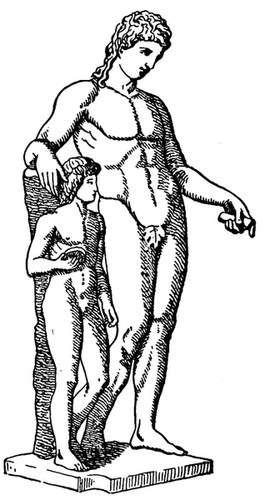
Fig. 58. Apollo with Hyacinthus
75. Hyacinthus. The fiery force of the Far-darter was not felt by the monsters of darkness alone. His friendship for the young and the vigorous was frequently as dangerous as it was dear to the objects of it. He was, for instance, passionately fond of a youth named Hyacinthus. The god of the silver bow accompanied the lad in his sports, carried the nets when he went fishing, led the dogs when he went to hunt, followed him in his excursions in the mountains, and neglected for him both lyre and arrows. One day they played a game of quoits; Apollo, heaving aloft the discus with strength mingled with skill, sent it high and far. Hyacinthus, excited with the sport and eager to make his throw, ran forward to seize the missile; but it bounded from the earth and struck him in the forehead. He fainted and fell. The god, as pale as himself, raised him and tried all his art to stanch the wound and retain the flitting life, but in vain. As when one has broken the stem of a lily in the garden it hangs its head and turns its flowers to the earth, so the head of the dying boy, as if too heavy for his neck, fell over on his shoulder. "Thou diest, Hyacinth," spake Phœbus, "robbed of thy youth by me. Would that I could die for thee! But since that may not be, my lyre shall celebrate thee, my song shall tell thy fate, and thou shalt become a flower inscribed with my regret." While the golden god spoke, the blood which had flowed on the ground and stained the herbage ceased to be blood; and a flower of hue more beautiful than the Tyrian sprang up, resembling the lily, save that this is purple and that silvery white. Phœbus then, to confer still greater honor, marked the petals with his sorrow, inscribing "Ai! ai!" upon them. The flower bears the name of Hyacinthus, and with returning spring revives the memory of his fate.91
It was said that Zephyrus (the west wind), who was also fond of Hyacinthus and jealous of his preference of Apollo, blew the quoit out of its course to make it strike Hyacinthus.
While this youth met his death by accident, another of Apollo's favorites, his own son, brought death upon himself by presumption. The story is as follows:
76. Phaëthon[2] was the son of Apollo and the nymph Clymene. One day Epaphus, the son of Jupiter and Io,92 scoffed at the idea of Phaëthon's being the son of a god. Phaëthon complained of the insult to his mother Clymene. She sent him to Phœbus to ask for himself whether he had not been truly informed concerning his parentage. Gladly Phaëthon traveled toward the regions of sunrise and gained at last the palace of the Sun. He approached his father's presence, but stopped at a distance, for the light was more than he could bear. Phœbus Apollo, arrayed in purple, sat on a throne that glittered with diamonds. Beside him stood the Day, the Month, the Year, the Hours, and the Seasons. Surrounded by these attendants, the Sun beheld the youth dazzled with the novelty and splendor of the scene, and inquired the purpose of his errand. The youth replied, "Oh, light of the boundless world, Phœbus, my father – if thou dost yield me that name – give me some proof, I beseech thee, by which I may be known as thine!" He ceased. His father, laying aside the beams that shone around his head, bade him approach, embraced him, owned him for his son, and swore by the river Styx93 that whatever proof he might ask should be granted. Phaëthon immediately asked to be permitted for one day to drive the chariot of the sun. The father repented of his promise and tried to dissuade the boy by telling him the perils of the undertaking. "None but myself," he said, "may drive the flaming car of day. Not even Jupiter, whose terrible right arm hurls the thunderbolts. The first part of the way is steep and such as the horses when fresh in the morning can hardly climb; the middle is high up in the heavens, whence I myself can scarcely, without alarm, look down and behold the earth and sea stretched beneath me. The last part of the road descends rapidly and requires most careful driving. Tethys, who is waiting to receive me, often trembles for me lest I should fall headlong. Add to this that the heaven is all the time turning round and carrying the stars with it. Couldst thou keep thy course while the sphere revolved beneath thee? The road, also, is through the midst of frightful monsters. Thou must pass by the horns of the Bull, in front of the Archer, and near the Lion's jaws, and where the Scorpion stretches its arms in one direction and the Crab in another. Nor wilt thou find it easy to guide those horses, with their breasts full of fire that they breathe forth from their mouths and nostrils. Beware, my son, lest I be the donor of a fatal gift; recall the request while yet thou canst." He ended; but the youth rejected admonition and held to his demand. So, having resisted as long as he might, Phœbus at last led the way to where stood the lofty chariot.
It was of gold, the gift of Vulcan, – the axle of gold, the pole and wheels of gold, the spokes of silver. Along the seat were rows of chrysolites and diamonds, reflecting the brightness of the sun. While the daring youth gazed in admiration, the early Dawn threw open the purple doors of the east and showed the pathway strewn with roses. The stars withdrew, marshaled by the Daystar, which last of all retired also. The father, when he saw the earth beginning to glow and the Moon preparing to retire, ordered the Hours to harness up the horses. They led forth from the lofty stalls the steeds full fed with ambrosia, and attached the reins. Then the father, smearing the face of his son with a powerful unguent, made him capable of enduring the brightness of the flame. He set the rays on the lad's head, and, with a foreboding sigh, told him to spare the whip and hold tight the reins; not to take the straight road between the five circles, but to turn off to the left; to keep within the limit of the middle zone and avoid the northern and the southern alike; finally, to keep in the well-worn ruts and to drive neither too high nor too low, for the middle course was safest and best.94
Forthwith the agile youth sprang into the chariot, stood erect, and grasped the reins with delight, pouring out thanks to his reluctant parent. But the steeds soon perceived that the load they drew was lighter than usual; and as a ship without ballast is tossed hither and thither on the sea, the chariot, without its accustomed weight, was dashed about as if empty. The horses rushed headlong and left the traveled road. Then, for the first time, the Great and Little Bears were scorched with heat, and would fain, if it were possible, have plunged into the water; and the Serpent which lies coiled round the north pole, torpid and harmless, grew warm, and with warmth felt its rage revive. Boötes, they say, fled away, though encumbered with his plow and unused to rapid motion.
When hapless Phaëthon looked down upon the earth, now spreading in vast extent beneath him, he grew pale, and his knees shook with terror. He lost his self-command and knew not whether to draw tight the reins or throw them loose; he forgot the names of the horses. But when he beheld the monstrous forms scattered over the surface of heaven, – the Scorpion extending two great arms, his tail, and his crooked claws over the space of two signs of the zodiac, – when the boy beheld him, reeking with poison and menacing with fangs, his courage failed, and the reins fell from his hands. The horses, unrestrained, went off into unknown regions of the sky in among the stars, hurling the chariot over pathless places, now up in high heaven, now down almost to the earth. The moon saw with astonishment her brother's chariot running beneath her own. The clouds began to smoke. The forest-clad mountains burned, – Athos and Taurus and Tmolus and Œte; Ida, once celebrated for fountains; the Muses' mountain Helicon, and Hæmus; Ætna, with fires within and without, and Parnassus, with his two peaks, and Rhodope, forced at last to part with his snowy crown. Her cold climate was no protection to Scythia; Caucasus burned, and Ossa and Pindus, and, greater than both, Olympus, – the Alps high in air, and the Apennines crowned with clouds.
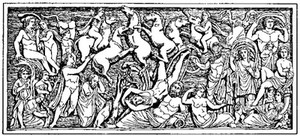
Fig. 59. The Fall of Phaëthon
Phaëthon beheld the world on fire and felt the heat intolerable. Then, too, it is said, the people of Æthiopia became black because the blood was called by the heat so suddenly to the surface; and the Libyan desert was dried up to the condition in which it remains to this day. The Nymphs of the fountains, with disheveled hair, mourned their waters, nor were the rivers safe beneath their banks; Tanaïs smoked, and Caïcus, Xanthus, and Mæander; Babylonian Euphrates and Ganges, Tagus, with golden sands, and Caÿster, where the swans resort. Nile fled away and hid his head in the desert, and there it still remains concealed. Where he used to discharge his waters through seven mouths into the sea, seven dry channels alone remained. The earth cracked open, and through the chinks light broke into Tartarus and frightened the king of shadows and his queen. The sea shrank up. Even Nereus and his wife Doris with the Nereïds, their daughters, sought the deepest caves for refuge. Thrice Neptune essayed to raise his head above the surface and thrice was driven back by the heat. Earth, surrounded as she was by waters, yet with head and shoulders bare, screening her face with her hand, looked up to heaven, and with husky voice prayed Jupiter, if it were his will that she should perish by fire, to end her agony at once by his thunderbolts, or else to consider his own Heaven, how both the poles were smoking that sustained his palace, and that all must fall if they were destroyed.
Earth, overcome with heat and thirst, could say no more. Then Jupiter, calling the gods to witness that all was lost unless some speedy remedy were applied, thundered, brandished a lightning bolt in his right hand, launched it against the charioteer, and struck him at the same moment from his seat and from existence. Phaëthon, with his hair on fire, fell headlong, like a shooting star which marks the heavens with its brightness as it falls, and Eridanus, the great river, received him and cooled his burning frame. His sisters, the Heliades, as they lamented his fate, were turned into poplar trees on the banks of the river; and their tears, which continued to flow, became amber as they dropped into the stream. The Italian Naiads reared a tomb for him and inscribed these words upon the stone:
Driver of Phœbus' chariot, Phaëthon,Struck by Jove's thunder, rests beneath this stone.He could not rule his father's car of fire,Yet was it much so nobly to aspire.9577. The Plague sent upon the Greeks before Troy. It was not, however, only by accident, or by the ill-advised action of those whom he loved, that Apollo's gifts of light and heat were turned into misfortunes. Mortals who offended him were leveled by the cruel sunstroke, by arrows of malarial venom, of manifold sickness and death.
When the host of the Achæans was encamped before Troy, the king of men, Atrides, unjustly declined to restore his captive, Chryseïs of the fair cheeks, to her father Chryses, the priest of far-darting Apollo. Then the aged Chryses went apart and prayed aloud, "Hear me, god of the silver bow, … let the Danaans pay by thine arrows for my tears!"
So spake he in prayer; and Phœbus Apollo heard him, and came down from the peaks of Olympus wroth at heart, bearing on his shoulders his bow and covered quiver. And the arrows clanged upon his shoulders in his wrath, as the god moved; and he descended like to night. Then he sate him aloof from the ships, and let an arrow fly; and there was heard a dread clanging of the silver bow. First did he assail the mules and fleet dogs, but afterward, aiming at the men his piercing dart, he smote; and the pyres of the dead burnt continually in multitude. Nor until Agamemnon had sent back his winsome captive to her father did Apollo remove from the Danaans the loathsome pestilence.96
78. The Punishment of Niobe is another illustration of the swift and awful vengeance of Apollo, and also of his sister Diana. This Niobe was the daughter of a certain Tantalus, king of Phrygia, who had been received at the table of the gods by his father Jupiter. But there was a strain of ingratitude and conceit in both father and daughter. The father not only betrayed the secrets of the gods, but, to ridicule their reputed omniscience, attempted at a banquet to deceive them into eating the roasted flesh of his own son Pelops. The gods were not deceived. Pelops was restored to life, – Tantalus consigned to Tartarus. The daughter Niobe, although she owed her happy marriage with Jupiter's son Amphion, and her seven stalwart sons and seven blooming daughters, to the favor of the gods and of Latona in particular, boasted of her birth, her marriage, and her offspring, bragged of her superiority to Latona, and, on one occasion, scoffed at the annual celebration in honor of the goddess and her two children. Surveying the people of Thebes with haughty glance, she said, "What folly to prefer beings whom you have never seen to those who stand before your eyes! Will you prefer to me this Latona, the Titan's daughter, with her two children? I have seven times as many. Were I to lose some of my children, I should hardly be left as poor as Latona with her two only. Put off the laurel from your brows, – have done with this worship!" The people left the sacred services uncompleted.
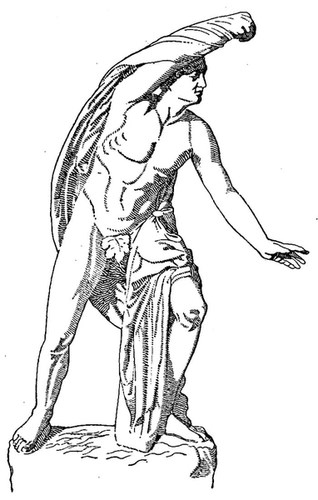
Fig. 60. A Son of Niobe
The goddess was indignant. On the Cynthian mountain top she thus addressed her son and daughter: "My children, I who have been so proud of you both and have been used to hold myself second to none of the goddesses except Juno alone, begin now to doubt whether I am indeed a goddess. I shall be deprived of my worship altogether unless you protect me." She was proceeding in this strain, but Apollo interrupted her. "Say no more," said he; "speech only delays punishment." So said Diana also. Darting through the air, veiled in clouds, they alighted on the towers of the city. Spread out before the gates was a broad plain where the youth of the city pursued their warlike sports. The sons of Niobe were there with the rest, – some mounted on spirited horses richly caparisoned, some driving gay chariots. Ismenos, the first-born, as he guided his foaming steeds was struck by an arrow from above. "Ah me!" he cried, – dropped the reins and fell lifeless. Another, hearing the sound of the bow, gave the rein to his horses and attempted to escape. The inevitable arrow overtook him as he fled. Two others, younger, stood wrestling breast to breast: one arrow pierced them both. Alphenor, an elder brother, hastened to the spot to render assistance, but fell in the act of brotherly duty. One only was left, Ilioneus. "Spare me, ye gods!" he cried, addressing all of them, in his ignorance that all needed not his supplication; and Apollo would have spared him, but the arrow had already left the string, and it was too late.

Fig 61. The Children of Niobe
When Niobe was acquainted with what had taken place, she was indignant that the gods had dared, and amazed that they had been able to do it. Her husband Amphion, overwhelmed with the blow, destroyed himself. But the mother knelt over the lifeless bodies and kissed them. Raising her pallid arms to heaven, "Cruel Latona," said she, "satiate thy hard heart while I follow to the grave my seven sons. Yet where is thy triumph? Bereaved as I am, I am still richer than thou, my conqueror." Scarce had she spoken, when the bow sounded and struck terror into all hearts except Niobe's alone. She was brave from excess of grief. Her daughters stood in garments of mourning over the biers of their dead brothers. One after another they fell, struck by arrows, beside the corpses that they were bewailing. Only one remained, whom the mother held clasped in her arms and covered, as it were, with her whole body. "Spare me one and that the youngest! Oh, spare me one of so many!" she cried; and while she spoke, that one fell dead. Desolate she sat among sons, daughters, husband, all dead, and seemed torpid with grief. The breeze moved not her hair, no color was on her cheek, her eyes glared fixed and immovable, there was no sign of life about her. Her very tongue cleaved to the roof of her mouth and her veins ceased to convey the tide of life. Her neck bent not, her arms made no gesture, her foot no step. She was changed to stone, within and without. Yet tears continued to flow; and borne on a whirlwind to her native mountain, she still remains, a mass of rock from which a trickling stream flows, the tribute of her never-ending grief.97
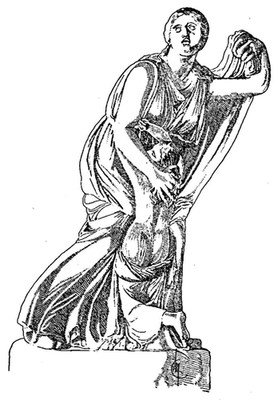
Fig. 62. Niobe and her Youngest Daughter
Amid nine daughters slain by ArtemisStood Niobe; she rais'd her head aboveThose beauteous forms which had brought down the scathWhence all nine fell, rais'd it, and stood erect,And thus bespake the goddess enthroned on high:"Thou heardest, Artemis, my daily prayerThat thou wouldst guide these children in the passOf virtue, through the tangling wilds of youth,And thou didst ever guide them: was it justTo smite them for a beauty such as thine?Deserv'd they death because thy grace appear'dIn ever modest motion? 'twas thy gift,The richest gift that youth from heaven receives.True, I did boldly say they might compareEven with thyself in virgin purity:May not a mother in her pride repeatWhat every mortal said?One prayer remainsFor me to offer yet.Thy quiver holdsMore than nine arrows: bend thy bow; aim here!I see, I see it glimmering through a cloud.Artemis, thou at length art merciful:My children will not hear the fatal twang."98
79. The Lamentation for Linus. How the people of Argos fell under the displeasure of Apollo is told in the story of Linus, a beautiful son of Apollo and Psamathe. In fear of her father the king, Psamathe exposed the child on the mountains where, brought up by shepherds among the lambs, he was in tender youth torn to pieces by dogs. Meanwhile, Psamathe herself was driven from her father's home; wherefore Apollo sent against the land of the Argives a monster that for a season destroyed the children, but at last was slain by a noble youth named Corœbus. To appease the wrathful deity, a shrine was erected midway between Argos and Delphi; and every year Linus and his mother were bewailed in melancholy lays by the mothers and children of Argos, especially by such as had lost by death their own beloved. The fate of Linus, like that of Hyacinthus and others who succumb in the springtime of life under the excessive love of some shining deity,99 typifies the sudden withering of herbs and flowers and of animal life, – the calves and lambs, young children too, under the fierce shafts of summer. The very name of Linus is taken from the refrain ai-linon, or "woe is me," of the lament anciently sung by the country people when thus afflicted by the unhealthy heats, because of which the crops fail and the dogs go mad and tear the little lambs to pieces. In the Iliad there is a beautiful picture which shows us that the song was not reserved completely for the dog days. It is of a vineyard teeming plenteously with clusters:
And there was a pathway through it by which the vintagers might go. And maidens and striplings in childish glee bare the sweet fruit in plaited baskets. And in the midst of them a boy made pleasant music on a clear-toned viol, and sang thereto a sweet Linos-song with delicate voice; while the rest with feet falling together kept time with the music and song.100
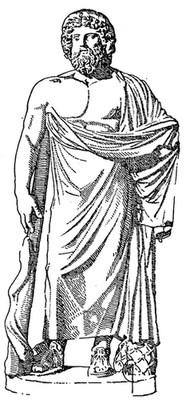
Fig. 63. Æsculapius
80. Æsculapius. The Thessalian princess Coronis (or the Messenian, Arsinoë) bore to Apollo a child who was named Æsculapius. On his mother's death the infant was intrusted to the charge of Chiron, most famous of the Centaurs, himself instructed by Apollo and Diana in hunting, medicine, music, and the art of prophecy. When the sage returned to his home bearing the infant, his daughter Ocyrrhoë came forth to meet him, and at sight of the child burst into a prophetic strain, foretelling, the glory that he should achieve. Æsculapius, when grown up, became a renowned physician; in one instance he even succeeded in restoring the dead to life. Pluto resented this, and, at his request, Jupiter struck the bold physician with lightning and killed him, but after his death received him into the number of the gods.101
81. Apollo in Exile. Apollo, indignant at the destruction of this son, wreaked his vengeance on the innocent workmen who had made the thunderbolt. These were the Cyclopes, who had their workshop under Mount Ætna, from which the smoke and flames of their furnaces are constantly issuing. Apollo shot his arrows at the Cyclopes, a deed which so incensed Jupiter that he condemned him to serve a mortal for the space of one year. Accordingly, Apollo went into the service of Admetus, king of Thessaly, and pastured his flocks for him on the verdant banks of the river Amphrysus. How the god lived among men, and what they thought of him, is well told in the following verses.
82. Lowell's Shepherd of King Admetus.
There came a youth upon the earth,Some thousand years ago,Whose slender hands were nothing worth,Whether to plow, or reap, or sow.Upon an empty tortoise-shellHe stretched some chords, and drewMusic that made men's bosoms swellFearless, or brimmed their eyes with dew.Then King Admetus, one who hadPure taste by right divine,Decreed his singing not too badTo hear between the cups of wine:And so, well pleased with being soothedInto a sweet half-sleep,Three times his kingly beard he smoothed,And made him viceroy o'er his sheep.His words were simple words enough,And yet he used them so,That what in other mouths was roughIn his seemed musical and low.Men called him but a shiftless youth,In whom no good they saw;And yet, unwittingly, in truth,They made his careless words their law.They knew not how he learned at all,For idly, hour by hour,He sat and watched the dead leaves fall,Or mused upon a common flower.It seemed the loveliness of thingsDid teach him all their use,For, in mere weeds, and stones, and springsHe found a healing power profuse.Men granted that his speech was wise,But, when a glance they caughtOf his slim grace and woman's eyes,They laughed, and called him good-for-naught.Yet after he was dead and goneAnd e'en his memory dim,Earth seemed more sweet to live upon,More full of love, because of him.And day by day more holy grewEach spot where he had trod,Till after-poets only knewTheir first-born brother as a god.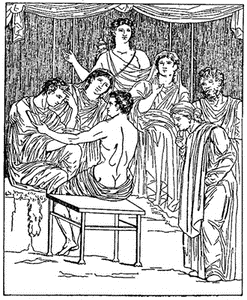
Fig. 64. Admetus must Die


